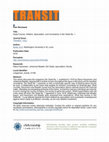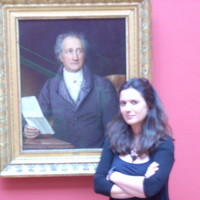Books by Kurt Beals
Forthcoming from Northwestern University Press, 2019

"Rhythmus 21" ist der Titel eines drei Minuten kurzen ungegenständlichen Films von Hans Richter a... more "Rhythmus 21" ist der Titel eines drei Minuten kurzen ungegenständlichen Films von Hans Richter aus dem Jahre 1921. Dem oberfl ächlichen Blick erscheint der Film zunächst als etwas kulturell Marginales und Unverbundenes. Eine kulturwissenschaftliche Analyse jedoch analysiert auf überraschende wie überzeugende Weise die zunächst verborgenen Verknüpfungen des Films ins kulturelle Feld. So enthüllt sich schließlich das konstruktivistisch avantgardistische Filmdokument als diskursives Archiv im Zentrum der 20er Jahre. Die kurzen Beiträge des Bandes erörtern die biografi schen Daten Hans Richters und die lebensweltlichen Hintergründe (Großstadt und Verkehr), die mediengeschichtliche Zusammenhänge (zum Röntgen- und Werbefilm, zum Sound, zu den Bildenden Künsten, zur Lettristik), die Verbindungen zu Wissenschaft und Technik (Architektur, Parawissenschaft, Esoterik, Pädagogik und Psychologie) und die Verknüpfungen zu kulturellen Feldern (Tanz, Narrativik).
Articles by Kurt Beals
Configurations, 2018
This article examines the origins of computer-generated poetry, both as a thought experiment and ... more This article examines the origins of computer-generated poetry, both as a thought experiment and as an aesthetic practice, with a focus on the works of the Stuttgart-based poet, theorist, philosopher, publisher, and professor Max Bense. My readings emphasize the ways in which computer-generated poems challenge fundamental assumptions about the relationship between language, technology, and subjectivity. In these works, the human subject emerges through a stochastic process of automated text generation, representing a form of cyborg subjectivity; Bense constructs the text itself as an interface of human and machine, an intersection of multiple modes of textual production.

TRANSIT
This article discusses the magazine Der Dada No. 1, published in 1919 by Raoul Hausmann and Johan... more This article discusses the magazine Der Dada No. 1, published in 1919 by Raoul Hausmann and Johannes Baader, arguing that a central concern throughout the issue is the future and its manifest uncertainty. Der Dada No. 1 presents us with a historically specific way of thinking about futurity as such, a relationship to the future that exploits its inherent uncertainty for financial gain. Most crucially, Hausmann and Baader reveal how this speculative stance extends beyond the financial realm, ultimately encompassing all facets of the future, so that the most any individual can hope for is not to change the course of history, but merely to game the system. While hyperinflation was still a few years off when Der Dada No. 1 appeared in June 1919, inflationary rumblings had already begun, and Hausmann and Baader aptly assessed their implications. What they portray in Der Dada No. 1 is an attitude towards the future defined by speculation and uncertainty; a background against which Dada is proffered, ironically, as the only reliable investment.

Translation Studies , Jan 14, 2014
This article critically engages with the pathos of impossibility as it is employed with respect t... more This article critically engages with the pathos of impossibility as it is employed with respect to translation in general, and to the works of Paul Celan in particular. I argue that the allegation of impossibility rests on the tenacious persistence of an equivalence model of translation, despite the anachronism of this model in the field of translation studies. I demonstrate the endurance of this model by considering responses to translations of Paul Celan – an author whose works, perhaps more than any other's, have been declared “untranslatable”. This claim, I argue, rests in part on an oversimplified view of Celan's poetry as a struggle with the German language, but it also implies a conventional, equivalence-based model of translation. Drawing on interpretations of Celan by Yoko Tawada, among others, I argue that Celan's poetics offers the basis for an alternative model of translation, one founded on a relationship of response and dialogue rather than resemblance and equivalence.
TranscUlturAl, Jan 1, 2009
Translations by Kurt Beals
In the course of compiling his highly acclaimed three-volume biography of Kafka, while foraying t... more In the course of compiling his highly acclaimed three-volume biography of Kafka, while foraying to libraries and archives from Prague to Israel, Reiner Stach made one astounding discovery after another: unexpected photographs, inconsistencies in handwritten texts, excerpts from letters, and testimonies from Kafka’s contemporaries that shed surprising light on his personality and his writing.
Book Reviews by Kurt Beals
Modernism/modernity, 2016
Papers by Kurt Beals
Configurations, 2018
This article examines the origins of computer-generated poetry, both as a thought experiment and ... more This article examines the origins of computer-generated poetry, both as a thought experiment and as an aesthetic practice, with a focus on the works of the Stuttgart-based poet, theorist, philosopher, publisher, and professor Max Bense. My readings emphasize the ways in which computer-generated poems challenge fundamental assumptions about the relationship between language, technology, and subjectivity. In these works, the human subject emerges through a stochastic process of automated text generation, representing a form of cyborg subjectivity; Bense constructs the text itself as an interface of human and machine, an intersection of multiple modes of textual production.
The German Quarterly, 2019











Uploads
Books by Kurt Beals
Articles by Kurt Beals
Translations by Kurt Beals
Book Reviews by Kurt Beals
Papers by Kurt Beals